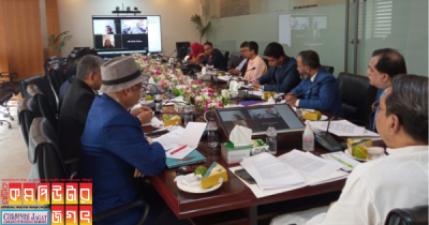Focus more on Research to Ensure Quality Education
According to the University Grants Commission (UGC) 2020 report, at present there are 64 public and 107 private universities in the country. Among them, 27 public and private universities have not allocated any kind of money for research. Higher education certificates have been disseminated in these higher education institutions without research programs.
Experts believe that the situation is far from ensuring quality education. In the era of the Fourth Industrial Revolution, degrees still relied on routine learning and the number of educated unemployed was increasing. In this situation, experts have advised determining the allocation and policy to increase the research program in the university. Many private universities have disputes over ownership. For them, it is impossible to allocate for research work as few students and only a few faculties are functioning. Since many new universities have started, it has not been possible to keep any kind of allocation for research. However, it is also not desirable that a university would run without research.
Many private universities are not interested in research work as they do not get allocations. The university has to create its funds in this sector. Moreover, the industries of the country should come forward. It will not be possible if it depends only on government allocation because the university is a non-profit institution. Funding for research can be created keeping that in mind. Private universities have to decide whether they will do teaching or research.
The funding crisis will not be solved if a research culture is not created. In addition to motivating students, teachers need to create interest. Money alone will not do it. We also have to think about how well we can utilise the sources from which the money is coming. No university in Bangladesh is ranked in the top 500 of famous universities of the world. However, neighbouring country India has several universities in the top 500 list. There is a lot of criticism about it. Criticism is, of course, justified. Therefore, the government needs to consider why the university is not in the list.
At one time the position of Dhaka University was good, but now it is falling behind in the ranking. This is disappointing for us because if there is no good or qualitative improvement in education, it is not possible to make any development sustainable. If the development is to be sustainable, the development in education and the allocation for research should be increased. Education can play a lesser role in development unless there is a massive improvement in research or qualitative research.
In this ranking, QS (Quacquarelli Symonds) evaluates the universities with a total of 100 marks in 6 indicators. Among them, academic reputation has 40 marks, reputation has 10, teacher-student ration 20, teachers' research 20 and international teacher ratio and international student ratio have 5 marks each. We are far behind in these indicators because the teacher-student ratio is not followed in the universities. For example, according to international standards, there should be 1 teacher for 20 students but many of our universities don't accept it or don't have it. It is alleged that the University Grants Commission does not exempt the posts of teachers as per the criteria.
Now we see that the authorities are appointing teachers with special qualifications (except education qualification) to the university, which is not desirable in any way. Stopping these is the demand of time. It is not right to make any kind of compromise in the recruitment of teachers. 100% transparency should be ensured in the recruitment of teachers. Vice-Chancellors should be more careful in appointing teachers and stop nepotism. If teachers do not give importance to Ph.D. and post-doctoral research, it will be difficult for our educational institutions to rank in university rankings. The University Grants Commission and the University Administration should take very quick steps to increase the teacher-student ratio. Higher Education and Research Commission should be constituted to improve the quality of research of university teachers and students. To get a promotion from Assistant Professor to Professor at every step of the university, there should be the research of international quality along with a Ph.D. degree. It is necessary to make such rules, which will work to get a place in the ranking of the university.
In a technology-dependent age, technology knowledge is less imparted in universities. As a result, there are fewer opportunities for Bangladeshi students in technology-based domestic and international institutions. This affects the education system of this country. As a result, students go abroad for better education with scholarships and many stay abroad permanently due to a lack of suitable job opportunities in the country. UNESCO recommends that at least 20 per cent of the national budget and 6 per cent of GDP be allocated to the education sector. But Bangladesh is still far from that target.
In the proposed budget for the fiscal year 2019-2020, the expenditure on the education and technology sector was estimated at 15.2 per cent of the total budget or about 79 thousand 525 crore taka. This allocation is much less than the requirement. Technical, research, and technical education are very important in building a developed nation and a developed country. It can be seen in our country that the tendency of students to work is high and the tendency to be an entrepreneur is very low because the students here do not get the necessary education to become entrepreneurs in university life. Most of the budget in universities is spent on development work, and the allocation for the research sector is very less. In the financial year 2019-20, the budget for 45 universities was approved for 8 thousand 88 crores 49 lakh taka. Out of this, the underdevelopment budget was Tk 5 thousand 89 crores 46 lakh. The research allocation for 37 universities was 64.4 million taka, which was 1.26 per cent of the underdevelopment budget. The rate of research allocation has decreased every year.
According to UGC's 2018 annual report, 20 public universities have no publications, six public universities and 15 private universities have no expenditure on research. While the renowned universities of the world give utmost importance to research, the government allocation for research is very inadequate. There is no substitute for research to generate basic knowledge. If knowledge is not created, teaching quality will also decrease. Research that is not of good and high quality is not considered for publication in 'Impact Journals'. Without research, even a university cannot progress. In such a situation, the value of the university in the global environment also decreases.
A Ph.D. is a teacher's gateway to the world of research. Only one-third of teachers in the country's universities have these degrees. For someone who has not done a Ph.D. or research himself, what will he teach or how will he supervise the research? University and research are synonyms. Universities are not only for awarding bachelor and master's degrees. For research, students are taken at the graduate-post-graduate level, part of whom will later be engaged in research. They will do MPhil-PhD research. Discover new aspects of knowledge. So, university means research. University status is determined by research and publications; not by the number of degrees awarded.
True enough that it is not possible to allocate financial incentives in a developing country like Bangladesh in the same way the United States, United Kingdom, China, or Japan do. Then even, if the amount of money allocated for research spends properly, Bangladesh would not lag in research. So, the bigger issue is whether the budget is allocated to the right person or institute. Many good professors and researchers in Bangladesh lose interest in research due to a lack of financial incentives, evaluation, and security or independence. If budget is given for research to right person or institute, the country will get its 'return' (positive result). Moreover, the country is moving forward with the global Sustainable Development Goals (SDGs). And there is no alternative to allocating research to promote sustainable development.
Bangladesh is not just a developing country; its economy is one of the most dynamic in the world. The country has set a target to become a developed country by 2041. To achieve this goal within the stipulated time, advanced knowledge, technology and skilled manpower are required for which a lot of research is required in various branches of science. Therefore, the policymakers must focus on this issue and work accordingly.







.png)






০ টি মন্তব্য